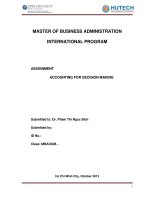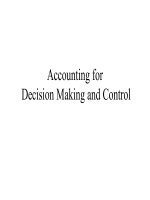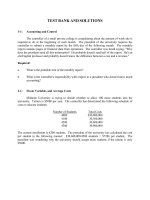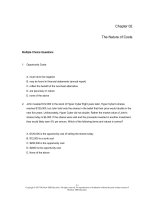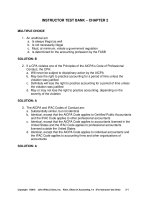Test bank accounting for decision making and control 9th 9e
Bạn đang xem bản rút gọn của tài liệu. Xem và tải ngay bản đầy đủ của tài liệu tại đây (87.67 KB, 14 trang )
Chapter 01
Introduction
Multiple Choice Questions
1. The firm's information system:
A. is always a single integrated
system
B. includes only financial
information
C. may include other information such as customer satisfaction surveys, in addition to
financial information
D. is less important as a firm grows
in size
E. none of the
above
2. Identify all the correct statements:
A. Managers naturally seek to maximize shareholders'
wealth
B. Managers act in their own interests, and so there is no way to align their interests
with those of the owners
C. To motivate managers in non-profit firms, no employee incentives
are needed
D. To align the interests of managers and owners, owners must design systems to
monitor and reward management behavior that increases the firm's profits
E. none of the
above
3. An internal accounting system should:
A. provide information to enable costs to be
minimized
B. provide financial accounting data for external reporting
purposes
C. provide management accounting information for
decision-making
D. provide data for tax
purposes
E. all of the
above
1-1
Copyright © 2017 McGraw-Hill Education. All rights reserved. No reproduction or distribution without the prior written consent of
McGraw-Hill Education.
4. Economic Darwinism:
A. explains why firms persist in inefficient
behavior
B. explains why some inefficient accounting practices
persist
C. explains why marmots eat
bears
D. explains why bears eat
marmots
E. none of the
above
5. Management accountants:
A. are internal
consultants
B. are mainly scorekeepers
C. focus on calculating product
costs
D. are ‘corporate
cops'
E. mostly a) and
d)
6. Internal control systems:
A. are the responsibility of the external
auditor
B. include anti-fraud
measures
C. are designed to allow financial
misrepresentation
D. require that one person perform all aspects of
a task
E. all of the
above
1-2
Copyright © 2017 McGraw-Hill Education. All rights reserved. No reproduction or distribution without the prior written consent of
McGraw-Hill Education.
7. Performance measures:
A. are critical in designing a reward
system
B. are unimportant in designing a reward
system
C. always influence people to achieve
them
D. are always worded
vaguely
E. are not needed to provide incentives because employees always want to do
the right thing
8. Micro Enterprises has the capacity to produce 10,000 widgets a month, and currently
makes and sells 9,000 widgets a month. Widgets normally sell for $6 each, and cost
an average of $5 to make, including fixed costs. The monthly fixed costs are $18,000.
Coyote Corp. has offered to buy 1,000 widgets at $4 each.
What is the "cost" per unit in the context of evaluating the offer from Coyote Corp.?
A. $
2
B. $
3
C. $
4
D. $
5
E. $
6
9. Micro Enterprises has the capacity to produce 10,000 widgets a month, and currently
makes and sells 9,000 widgets a month. Widgets normally sell for $6 each, and cost
an average of $5 to make, including fixed costs. The monthly fixed costs are $18,000.
Coyote Corp. has offered to buy 1,000 widgets at $4 each.
On this information alone, should Micro accept the offer?
A. No, because it will lose $1 per
unit
B. No, because it will lose $2 per
unit
C. No, because it will exceed
capacity
D. Yes, because it makes $1 per unit in the
short run
E. Unable to
determine
1-3
Copyright © 2017 McGraw-Hill Education. All rights reserved. No reproduction or distribution without the prior written consent of
McGraw-Hill Education.
10. Micro Enterprises has the capacity to produce 10,000 widgets a month, and currently
makes and sells 9,000 widgets a month. Widgets normally sell for $6 each, and cost
an average of $5 to make, including fixed costs. The monthly fixed costs are $18,000.
Coyote Corp. has offered to buy 1,000 widgets at $4 each.
What other factors should be taken into consideration?
A. The impact on the normal selling price
of $6
B. Will an additional shift be needed to complete
the order?
C. Are future orders from Coyote
likely?
D. Does the special price comply with the RobinsonPatman Act?
E. All of the
above
11. Micro Enterprises has the capacity to produce 10,000 widgets a month, and currently
makes and sells 9,000 widgets a month. Widgets normally sell for $6 each, and cost
an average of $5 to make, including fixed costs. The monthly fixed costs are $18,000.
Coyote Corp. has offered to buy 1,000 widgets at $4 each.
Assuming the same story, but Coyote's offer is for 1,500 units (all or nothing), should
the offer be accepted?
A. No, because it will lose $1 per
unit
B. No, because the opportunity costs outweigh
the gains
C. No, (indifferent or worse) because the opportunity costs equal
the gains
D. Yes, because it makes $1 per unit in the
short run
E. Unable to
determine
Essay Questions
1-4
Copyright © 2017 McGraw-Hill Education. All rights reserved. No reproduction or distribution without the prior written consent of
McGraw-Hill Education.
12. Accounting and Control
The controller of a small private college is complaining about the amount of work
she must do at the beginning of each month. The president of the university requires
the controller to submit a monthly report by the fifth day of the following month. The
monthly report contains pages of financial data from operations. The controller was
heard saying, "Why does the president need all this information? He probably doesn't
read half of the report. He's an English professor and probably doesn't know the
difference between a cost and a revenue."
Required:
a. What is the probable role of the monthly report?
b. What is the controller's responsibility with respect to a president who doesn't
know much accounting?
1-5
Copyright © 2017 McGraw-Hill Education. All rights reserved. No reproduction or distribution without the prior written consent of
McGraw-Hill Education.
Chapter 01 Introduction Answer Key
Multiple Choice Questions
1.
The firm's information system:
A. is always a single integrated
system
B. includes only financial
information
C. may include other information such as customer satisfaction surveys, in
addition to financial information
D. is less important as a firm grows
in size
E. none of the
above
The firm's information system includes many kinds of financial and non-financial
information.
AACSB: Knowledge Application
AICPA: BB Industry
AICPA: FN Leveraging Technology
Accessibility: Keyboard Navigation
Blooms: Remember
Difficulty: 1 Easy
Topic: Managerial Accounting: Decision Making and Control
2.
Identify all the correct statements:
A. Managers naturally seek to maximize shareholders'
wealth
B. Managers act in their own interests, and so there is no way to align their
interests with those of the owners
C. To motivate managers in non-profit firms, no employee incentives
are needed
D. To align the interests of managers and owners, owners must design systems to
monitor and reward management behavior that increases the firm's profits
E. none of the
above
To minimize conflicts between the economic interests of managers and owners, the
owners need both systems to monitor the manager's performance and systems of
rewards or incentives.
AACSB: Knowledge Application
AICPA: BB Industry
1-6
Copyright © 2017 McGraw-Hill Education. All rights reserved. No reproduction or distribution without the prior written consent of
McGraw-Hill Education.
AICPA: FN Decision Making
AICPA: FN Risk Analysis
Accessibility: Keyboard Navigation
Blooms: Remember
Difficulty: 1 Easy
Topic: Management Accountant's Role in the Organization
Topic: Managerial Accounting: Decision Making and Control
3.
An internal accounting system should:
A. provide information to enable costs to be
minimized
B. provide financial accounting data for external reporting
purposes
C. provide management accounting information for
decision-making
D. provide data for tax
purposes
E. all of the
above
A well designed internal accounting system should provide data for external
purposes, such as financial reporting and tax, as well as internal purposes such as
cost control, assessing performance and determining rewards. It is economically
inefficient to maintain multiple accounting systems.
AACSB: Knowledge Application
AICPA: BB Industry
AICPA: FN Decision Making
Accessibility: Keyboard Navigation
Blooms: Remember
Difficulty: 1 Easy
Topic: Design and Use of Cost Systems
4.
Economic Darwinism:
A. explains why
behavior
B. explains why
persist
C. explains why
bears
D. explains why
marmots
E. none of the
above
firms persist in inefficient
some inefficient accounting practices
marmots eat
bears eat
Inefficient accounting systems may continue to exist either because they have
proved better than other systems or because better systems have not been yet
discovered.
AACSB: Knowledge Application
AICPA: BB Marketing
1-7
Copyright © 2017 McGraw-Hill Education. All rights reserved. No reproduction or distribution without the prior written consent of
McGraw-Hill Education.
AICPA: FN Risk Analysis
Accessibility: Keyboard Navigation
Blooms: Remember
Difficulty: 1 Easy
Topic: Marmots and Grizzly Bears
5.
Management accountants:
A. are internal
consultants
B. are mainly scorekeepers
C. focus on calculating product
costs
D. are ‘corporate
cops'
E. mostly a) and
d)
While score-keeping and product costing are tasks performed by today's
management accountants, these usually are considered minor. The major roles
they perform are internal consultant in terms of providing information to aid
other's decision making and corporate cop in terms of providing control systems to
prevent fraud and performance measures for incentive systems.
AACSB: Knowledge Application
AICPA: BB Industry
AICPA: FN Decision Making
Accessibility: Keyboard Navigation
Blooms: Understand
Difficulty: 2 Medium
Topic: Management Accountant's Role in the Organization
6.
Internal control systems:
A. are the responsibility of the external
auditor
B. include anti-fraud
measures
C. are designed to allow financial
misrepresentation
D. require that one person perform all aspects of
a task
E. all of the
above
The internal control system is designed to safeguard assets, protect the integrity
of the accounting information system, and to prevent fraud. A key practice is the
separation of duties to ensure that critical tasks are performed by two or more
people.
AACSB: Knowledge Application
AICPA: BB Industry
1-8
Copyright © 2017 McGraw-Hill Education. All rights reserved. No reproduction or distribution without the prior written consent of
McGraw-Hill Education.
AICPA: FN Decision Making
Accessibility: Keyboard Navigation
Blooms: Understand
Difficulty: 2 Medium
Topic: Management Accountant's Role in the Organization
7.
Performance measures:
A. are critical in designing a reward
system
B. are unimportant in designing a reward
system
C. always influence people to achieve
them
D. are always worded
vaguely
E. are not needed to provide incentives because employees always want to do
the right thing
Performance measures are critical in designing a reward system. If poorly
specified, they may promote dysfunctional behavior or encourage managers to
undertake actions not in the best interest of the organization. If managers'
performance is not measured and not rewarded, it is unlikely that managers will
focus on enhancing the owner's wealth.
AACSB: Knowledge Application
AICPA: BB Industry
AICPA: FN Decision Making
Accessibility: Keyboard Navigation
Blooms: Understand
Difficulty: 2 Medium
Topic: Evolution of Management Accounting: A Framework for Change
1-9
Copyright © 2017 McGraw-Hill Education. All rights reserved. No reproduction or distribution without the prior written consent of
McGraw-Hill Education.
8.
Micro Enterprises has the capacity to produce 10,000 widgets a month, and
currently makes and sells 9,000 widgets a month. Widgets normally sell for $6
each, and cost an average of $5 to make, including fixed costs. The monthly fixed
costs are $18,000. Coyote Corp. has offered to buy 1,000 widgets at $4 each.
What is the "cost" per unit in the context of evaluating the offer from Coyote
Corp.?
A. $
2
B. $
3
C. $
4
D. $
5
E. $
6
The "cost" per unit in this case is the variable cost that must be covered. Since
Micro has excess capacity, the only cost the firm incurs to produce an additional
1,000 widgets is the variable cost. The average cost of $5 includes the fixed cost
per unit of $2 ($18,000/9000 units). Hence, the variable cost per widget is just the
average cost of $5 less the fixed cost per widget of $2, or $3.
AACSB: Knowledge Application
AICPA: BB Industry
AICPA: FN Measurement
Accessibility: Keyboard Navigation
Blooms: Apply
Difficulty: 3 Hard
Topic: Vortec Medical Probe Example
1-10
Copyright © 2017 McGraw-Hill Education. All rights reserved. No reproduction or distribution without the prior written consent of
McGraw-Hill Education.
9.
Micro Enterprises has the capacity to produce 10,000 widgets a month, and
currently makes and sells 9,000 widgets a month. Widgets normally sell for $6
each, and cost an average of $5 to make, including fixed costs. The monthly fixed
costs are $18,000. Coyote Corp. has offered to buy 1,000 widgets at $4 each.
On this information alone, should Micro accept the offer?
A. No, because it will lose $1 per
unit
B. No, because it will lose $2 per
unit
C. No, because it will exceed
capacity
D. Yes, because it makes $1 per unit in the
short run
E. Unable to
determine
The average fixed cost is NOT relevant, as fixed costs will not change in the short
run. The offer's contribution margin (sales price $4 minus variable cost $3) is
positive, and in the absence of other information should be accepted.
AACSB: Communication
AACSB: Knowledge Application
AICPA: BB Industry
AICPA: FN Decision Making
Accessibility: Keyboard Navigation
Blooms: Apply
Difficulty: 3 Hard
Topic: Vortec Medical Probe Example
1-11
Copyright © 2017 McGraw-Hill Education. All rights reserved. No reproduction or distribution without the prior written consent of
McGraw-Hill Education.
10.
Micro Enterprises has the capacity to produce 10,000 widgets a month, and
currently makes and sells 9,000 widgets a month. Widgets normally sell for $6
each, and cost an average of $5 to make, including fixed costs. The monthly fixed
costs are $18,000. Coyote Corp. has offered to buy 1,000 widgets at $4 each.
What other factors should be taken into consideration?
A. The impact on the normal selling price
of $6
B. Will an additional shift be needed to complete
the order?
C. Are future orders from Coyote
likely?
D. Does the special price comply with the RobinsonPatman Act?
E. All of the
above
All of the factors mentioned are relevant. Answers to a), b) and d) could have a
negative effect on the decision to accept the offer. Future orders from Coyote
could be viewed favorably, provided that they do not utilize factory resources
devoted to the regular, more profitable, customers.
AACSB: Knowledge Application
AICPA: BB Industry
AICPA: FN Decision Making
Accessibility: Keyboard Navigation
Blooms: Understand
Difficulty: 2 Medium
Topic: Vortec Medical Probe Example
1-12
Copyright © 2017 McGraw-Hill Education. All rights reserved. No reproduction or distribution without the prior written consent of
McGraw-Hill Education.
11.
Micro Enterprises has the capacity to produce 10,000 widgets a month, and
currently makes and sells 9,000 widgets a month. Widgets normally sell for $6
each, and cost an average of $5 to make, including fixed costs. The monthly fixed
costs are $18,000. Coyote Corp. has offered to buy 1,000 widgets at $4 each.
Assuming the same story, but Coyote's offer is for 1,500 units (all or nothing),
should the offer be accepted?
A. No, because it will lose $1 per
unit
B. No, because the opportunity costs outweigh
the gains
C. No, (indifferent or worse) because the opportunity costs equal
the gains
D. Yes, because it makes $1 per unit in the
short run
E. Unable to
determine
At 1500 units, Coyote's offer brings in a total of $1,500 (contribution margin of $1
per unit * 1,500 units). To accept the order, 500 regular customers must be
displaced (9,000 normal + 1500 Coyote units exceeds the maximum capacity of
10,000 units). Each displaced customer costs the firm $3 ($6 normal selling price
minus $3 variable costs), so the firm must give up $1,500 from the regular
customers. At best, the firm is indifferent between the two choices. In practice, the
negative impact on existing customers, sacrificed for no financial gain, would lead
to a rejection of the offer.
AACSB: Knowledge Application
AICPA: BB Industry
AICPA: FN Decision Making
Accessibility: Keyboard Navigation
Blooms: Apply
Difficulty: 3 Hard
Topic: Vortec Medical Probe Example
Essay Questions
1-13
Copyright © 2017 McGraw-Hill Education. All rights reserved. No reproduction or distribution without the prior written consent of
McGraw-Hill Education.
12.
Accounting and Control
The controller of a small private college is complaining about the amount of work
she must do at the beginning of each month. The president of the university
requires the controller to submit a monthly report by the fifth day of the following
month. The monthly report contains pages of financial data from operations. The
controller was heard saying, "Why does the president need all this information? He
probably doesn't read half of the report. He's an English professor and probably
doesn't know the difference between a cost and a revenue."
Required:
a. What is the probable role of the monthly report?
b. What is the controller's responsibility with respect to a president who doesn't
know much accounting?
a. There are two possible roles for the monthly report: facilitating planning
decisions and control. Monthly reports provide more timely information than
annual reports. With monthly reports the president can identify problem areas
more quickly and make corrective actions. The president may also use the monthly
reports to evaluate the work of his managers. The monthly reports provide
information about how managers are performing.
b. If the president of the university is unfamiliar with accounting numbers, the
controller must adapt the monthly report to make it more comprehensible. The
controller may even want to highlight areas in the report that might need
attention.
AACSB: Communication
AACSB: Knowledge Application
AICPA: BB Industry
AICPA: FN Decision Making
Blooms: Understand
Difficulty: 2 Medium
Topic: Design and Use of Cost Systems
Topic: Management Accountant's Role in the Organization
1-14
Copyright © 2017 McGraw-Hill Education. All rights reserved. No reproduction or distribution without the prior written consent of
McGraw-Hill Education.
